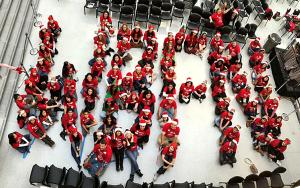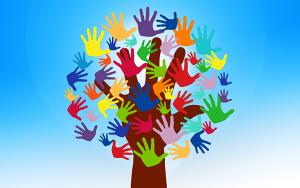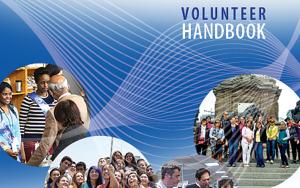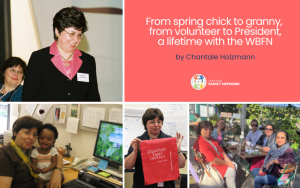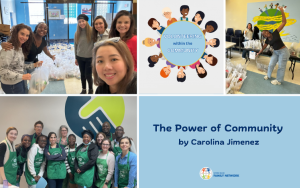
Tell us about Margaret McNamara Education Grants (MMEG).
MMEG awards education grants to women from developing countries for their university studies. We believe that education is a powerful tool. We invest in the empowerment of these women, confident in our grantees’ capacity to create transformational change by serving as role models, mentors and leaders. MMEG contributes to the World Bank’s goal of ending poverty and addresses sustainable development goals # 1 (no poverty), # 4 (quality education) and # 5 (gender equality). Our commitment to women’s education is in line with the 2018 World Development Report “Learning to Realize Education’s Promise”. There is a clear connection between the mission of our organization and the mission of the World Bank.
MMEG was founded in 1981 by members of the Women's Information and Volunteer Services, present-day World Bank Family Network, to honor the memory of Margaret McNamara, an ardent advocate for gender equality and education. Margaret was married to Robert McNamara, the World Bank’s 5th President, and used her influence to integrate these two critical development components into the WBG’s programs.
MMEG has 501(c)(3) tax-exemption, not-for-profit public charity status. We are the only non-profit to be housed within the World Bank. We are constantly striving for wider name recognition within the World Bank. We are working to generate visibility for our mission objectives in a way that helps us to build a sustainable donor base. I would like to see us connect further with World Bank country offices, especially in countries where we have MMEG programs and grantees.
Let’s talk a bit about the educational grants. How many do you provide annually? What types of candidates do you look for?
We have four university-level funding programs: US-Canada, South Africa, Latin America and Trinity Washington University here in Washington DC.
To date, MMEG has awarded 386 grants, whose total value exceeds USD 3 million. In fiscal year 2018, we awarded 33 grants, almost equally divided among our three regions. The number of grants we award annually depends on the funds we have available, as well as the quality of applications we receive.
Our grants go to exceptional women whose education we are proud to support. Most grantees are pursuing masters or PhD level studies but we support all levels of university training and certification. The key criteria for selection are a well-articulated and demonstrated commitment to improving the situation of women and children in developing countries. Some of our applicants are already well-respected leaders in grass-root organizations, but are studying to formalize their knowledge with university degrees. Other criteria are good academic standing, financial need, and nationality that corresponds to the WBG client group. Grant recipients are selected by volunteer Selection Committees.
MMEG grants are awarded not just for need – which, as you know, cannot always be effectively measured - but because we see potential that is worth investing in.
Interested staff can learn more about our application requirements and the application process on our website.
Can you tell us a bit about MMEG grant recipients?
What interests MMEG are women who leverage their work at the community level to work towards policy and governance change, not just at the individual, but at the institutional level. I can give you two wonderful examples.
Mariela Escobedo is a 2017 grantee who advocates access to higher education for indigenous women in Mexico. Her research focuses on the barriers that marginalize indigenous girls and restrict their access to education. Mariela’s ultimate aim is to shape policies based on the reality on-the-ground. This very young woman has the potential to make an impact that will extend way beyond her local community.
Esther Kisaakye, or should I say Justice Dr. Esther Kisaakye, of the Supreme Court of Uganda, received a grant from MMEG in 2005 to support her law studies. Esther’s position alone makes her an extraordinary role model. Furthermore, she has used her position to initiate change from within and outside the Judiciary that has and will continue to improve women’s lives. In 2013, Esther wrote the lead judgment in a Supreme Court case that ruled that upon divorce, a spouse could share in the property that was acquired either during the marriage or before the marriage if she or he can prove contribution either to its acquisition or to its development. This is a victory for women in Uganda and now the law. Speaking about this decision at an annual MMEG event held in the WB Atrium, Esther expressed her satisfaction that even as a “baby judge”, and “against the background of anti-women’s rights sentiments”, her senior male colleagues unanimously endorsed her position. Let me quote Esther:
Empowering women through graduate training strategically positions them to…participate in high level judicial decision-making, with the hope of making a difference for marginalized women and children. [This is] why the work of MMEG is so critically important – providing women such as myself with a financial push to the finishing line.
Esther and Mariela were great investments for MMEG. Of course, not every MMEG grant recipient will become a Supreme Court justice, but for every application we screen we have the same question--does this story have that kind of potential?
Tell us a bit about the MMEG Arts & Crafts Fair that will be taking place in the Preston auditorium at the World Bank from November 13-15, 2018.
The annual Arts & Crafts Fair has been our main fundraising tool for the past thirty years. It started out very informally with individual volunteers hosting small-scale events to raise funds. We expanded in 2009 with the Fair’s move from the H Building to the Preston auditorium.
Proceeds of the Fair go directly towards funding grants. They come from a percentage of sales from vendors, flat fees for vendor participation and sales from MMEG-sponsored treasure and gourmet tables. The Fair is a great time, before the holiday rush sets in, for World Bank staff and visitors to stop by the Preston auditorium and take advantage of the beautiful items on sale. With the added benefit of knowing that you are shopping for a cause!
What are the other ways to support MMEG?
In addition to shopping at the Fair, WBFN members can directly support MMEG’s mission of investing in the education of women through financial donations or by volunteering.
Donations may be made through our website, through the WBG’s Community Connections Campaign, internal transfers through BFSFCU Popmoney or directly by check to MMEG at MSN J2-202. (For more details, contact mmeg@worldbank.org)
The Bank Fund Staff Federal Credit Union, whose long-time support we gratefully acknowledge, is collecting foreign coins on behalf of MMEG, so dig out those old unused coins sitting at the bottom of your purse. Use change to make change!
We are also always seeking dedicated volunteers to help organize events such as the Fair, support our fundraising and outreach activities and of course screen grant applications. Please contact us at mmeg@worldbank.org to volunteer.
Highlights
- Reiko Niimi is president of Margaret McNamara Education Grants (MMEG)
- The annual MMEG Arts & Crafts fair at the Preston Auditorium, World Bank, Washington, DC kicks off November 13 and will continue through Thursday, November 15.
- In addition to shopping at the fair, WBFN members can support the education of women through financial donations and/or by volunteering.
Links

